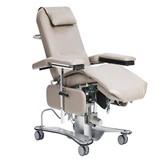A common fear amongst those nearing end-of-life is the fear of losing their identity and sense of dignity.
One of the most important things you can do to help mitigate these fears is to remember that you are caring for individuals who all have different needs, experiences and desires. We all should be treated with respect and humility1
In this article we discuss 8 principles you might use to maintain your patient’s dignity2.
1. Make patients and carers feel welcome
A simple welcome to make your patients feel comfortable, safe and relaxed can mean a lot to them at this point in their life. Making sure you have introduced yourself and what your role is in their care and also having clearly displayed visiting times for carers and family throughout a ward.
2. Communicate clearly and frequently
Clear and frequent communication with your patients and carers at this time is critical in ensuring dignity and respect. Remember to talk to your patients, not over them and involve them in the conversations surrounding their care. Always ask if they have any questions or concerns and discuss ways to meet their needs, using everyday language and terminology to avoid confusion is also recommended.
3. Protect your patient's privacy during consultations and treatment
When performing a consult or treatment on your patient consider their right to privacy, is there a private or empty room available? Sometimes a curtained bed space may not be private enough for your patient. Simple gestures like asking to enter if a door or curtain is closed or finding ways to manage a patient differently who is embarrassed of their catheter bag, all aid in improving patient dignity.
4. Respect the needs of patients and carers
Patients nearing end-of-life or those who are critically ill have very specific needs and levels of care. The care provided to these patients is an intimate and private event occurring at a time when your patient feels the most vulnerable and deserves to be treated with humility and respect. Consider single rooms for privacy if some are available, talk to all staff who will be involved about visiting conditions, be aware of keeping environmental noise to a minimum.
5. Respect cultures and beliefs
Are you familiar with your patient’s cultural background? Do you know who their family spokesperson is? Is there any religion or faith tradition you need to consider for your patient's care? Do they have dietary requirements?
All these questions, if the answers are known and documented for all staff to note then your patients dignity has been considered. Try to ascertain any religions, beliefs or cultural issues relevant to the intended course of care - involve the carers and family.
6. Manage noise for patient comfort
Sounds can travel easily in hospital hallways and rooms, it can be easy for a patient to become uncomfortable with the level of noise. Some helpful tips to mitigate noise; actively but courteously manage noise made by other patients, carers or visitors early on, keep voices as low as possible during the times where patients are sleeping lastly, personal conversations should occur away from patient quarters when possible and conversations taking place in hallways should be mindful of the topics.
7. Avoid mixed gender accommodation
Where possible avoid placing patients in mixed gender wards, when patients are unwell and depending on the level of care required can sometimes be an intimate situation. Being in a room with patients that are similar reduces embarrassment and can help patients relax and feel safe. If you’ve tried everything in your power to provide a same gender room or ward bay but it still can’t be provided, making sure the patient’s privacy is maintained should be top priority.
8. Provide single sex bathrooms
Making sure patients have access to same gender bathrooms, and ensuring that they don’t have to walk through opposite sex areas to reach their bathroom. This helps to maintain self-respect and dignity when you're feeling unwell. It is also recommended that children and young adults shouldn’t have to walk through adult units to reach their own facilities and vice versa.
Facilities should also ensure that facilities are kept clean and sanitising products are available as well as clearly marked bathrooms and easy accessibility for all2.
View the Contour Conceal, a mortuary transport stretcher designed to maintain privacy and dignity in a difficult time.
References
Crossroads Hospice (2017). Seven Ways to Maintain Patient Dignity at End of Life. [online] Crossroadshospice.com. Available at: https://www.crossroadshospice.com/hospice-palliative-care-blog/2017/july/27/seven-ways-to-maintain-patient-dignity-at-end-of-life/
NSW Health (2009). Respecting Patient Privacy and Dignity in NSW Health Eight ways to make a difference: for NSW Health Employees. [online] Available at: https://www.health.nsw.gov.au/Performance/Publications/ct-8ways-booklet.pdf.






-160x160-state_article-rel-cat.png)


-160x160-state_article-rel-cat.png)






















